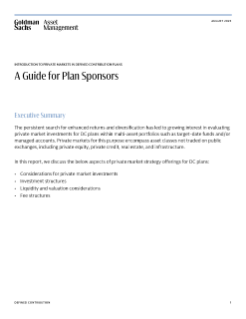Alternatives
Private Markets Developments for Retirement Plans
Executive Summary
The persistent search for enhanced returns and diversification has led to growing interest in evaluating private market investments for DC plans within multi-asset portfolios such as target-date funds and/or managed accounts. Private markets for this purpose encompass asset classes not traded on public exchanges, including private equity, private credit, real estate, and infrastructure.
In this report, we discuss the below aspects of private market strategy offerings for DC plans:
- Considerations for private market investments
Private market investments may offer higher returns compared to publicly traded assets due to operational advantages. Private credit has historically generated higher yield than broadly syndicated loans and high yield of a similar credit rating. Finally, a key consideration to incorporate private markets into DC plans is private markets’ ability to broaden out the investment universe and incorporate asset classes with lower correlation to public market assets. - Investment structures
Private markets strategies may be available through several avenues, including white-labeled multi-asset portfolios, target date funds (TDFs) and custom target date funds, investments used by managed accounts and balanced funds or total allocation portfolios. - Liquidity and valuation considerations
Semi-liquid private market investments are a new class of investments that expand the range of investors who can access private market securities and offer an opportunity to access potentially higher returning investments compared to traditional liquid assets.
Historically, private market strategies might be valued only periodically and may be provided to investors retroactively. Some of the new investment vehicles, however, within the semi-liquid class of private markets are providing more frequent valuations. - Fee structures
Given the impact of investment fees, it is important that plan fiduciaries evaluate the potential benefits and costs associated with private market investing, including management fees, performance fees (or carried interest), acquired fund fees and expenses, and operating fees and expenses.
Source: Goldman Sachs Asset Management as of July 2025. Diversification does not protect an investor from market risk and does not ensure a profit. No assurance can be given that the client’s investment objective may be achieved.
Private Markets Developments for Retirement Plans
Introduction to Private Markets in Defined Contribution Plans: A Guide for Plan Sponsors

Market Insights in Your Inbox
Discover our views on the economy, markets and investment strategy by subscribing to our newsletter.
Start the Conversation
Contact Goldman Sachs Asset Management for a detailed discussion of your needs.
